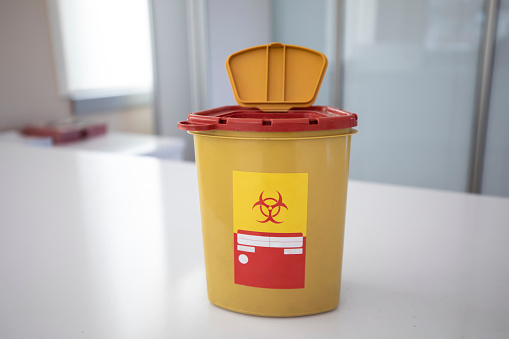What Are The Different Classifications Of Waste Products

Waste is an inevitable hazard in our society, and it’s important to understand how different types of waste are classified.
Understanding the different classifications of disposal of clinical waste can help us develop better strategies for disposal and recycling. In this blog post, we will explore the various classifications of waste products, from hazardous materials to recyclable items and everything in between.
We will also discuss the implications of each classification on the environment, as well as what we can do to minimize our waste production. Read on to learn more about waste and its impact on our planet.
Types of Waste
There are many types of waste products, but they can generally be classified into four categories: hazardous, solid, liquid, and medical.
Hazardous wastes are substances that can potentially cause harm to humans or the environment. They include chemicals, oils, paints, and batteries.
Dental waste disposal is materials that are solids in their original forms, such as paper or glass. Liquid wastes are liquids in their original forms, such as sewage or wastewater. Medical wastes are materials that come from health care facilities, such as used needles or bandages.
Classifications of Waste
There are four main types of clinical waste disposal: solids, liquids, gases, and sludge. Solids include anything that is recyclable or compostable such as paper, plastics, metal, glass, and textiles.
Liquids include anything that can be poured down the drain such as water, sewage, and chemical waste. Gases include any emissions from factories or automobiles.
Sludge is any solid waste that contains hazardous materials and cannot be recycled or composted such as medical waste or nuclear waste.
Biodegradable Waste
There are four different classifications of waste products: biodegradable, recyclable, hazardous, and non-hazardous.
Biodegradable waste is defined as any organic matter that can be broken down by bacteria or other living organisms. This includes yard waste, food scraps, and paper products.
Biodegradable waste is the easiest type of waste to manage because it can be composted or recycled back into the environment. Recyclable waste is defined as any material that can be reused or recycled.
This includes glass, plastic, metal, and paper products. Recycling aids to reduce the amount of disposable waste that is sent to landfills and incinerators. It also protects natural resources and energy.
Hazardous waste is defined as any material that is flammable, corrosive, toxic, or reactive. This includes chemicals, batteries, oil, paint, and electronics. Sharps waste disposal must be managed carefully to avoid harming people or the environment.
Non-hazardous waste is defined as any material that does not pose a threat to human health or the environment. This includes construction debris, yard waste, and most household items. Non-hazardous waste can usually dispose of in a regular trash bin.
Non-Biodegradable Waste
Non-biodegradable waste is any waste that cannot be done by natural processes. This type of waste includes things like plastic, metal, and glass. Non-biodegradable waste can stay in the environment for a long time, which can cause pollution and damage to ecosystems.
Hazardous Waste
Hazardous waste is any waste that poses a significant threat to public health or the environment. Hazardous wastes can be liquids, solids, or gases, and they can generate from a variety of sources, including manufacturing facilities, hospitals, and households.
There are Four Main Categories of Hazardous Wastes:
- Ignitable: Wastes that are easily combustible and can cause fires. Examples include solvents and oils.
- Reactive: Wastes that are chemically reactive and can cause explosions or release toxic fumes when mixed with other substances. Examples include chlorine and mercury.
- Corrosive: Wastes that are corrosive and can eat away at flesh or metal. Examples include acids and bases.
- Toxic: Wastes that are poisonous and can cause death or serious illness if ingested or inhaled. Examples include lead and asbestos
Recyclable Waste
Most waste products can be classified into one of four categories: recyclable, hazardous, biomedical, and radioactive.
Recyclable waste is materials that can reuse or recycle. This includes paper, plastics, metal cans, and glass bottles.
Hazardous waste is any material that is flammable, corrosive, poisonous, or otherwise poses a health or safety risk. Biomedical waste is any medical waste such as sharps (needles and syringes), blood or body fluids, and tissue samples.
Radioactive waste is any material that emits radiation, such as uranium ore and nuclear power plant waste.
Solutions For Management and Recycling Waste
- Hazardous waste management
- Recycling programs
Hazardous waste management is the process of handling, treating, and disposing of hazardous waste in a safe and environmentally responsible manner.
Hazardous wastes are those things that are dangerous or potentially harmful to human health or the environment. They can come from a variety of sources, including manufacturing facilities, hospitals, households, and businesses.
Recycling programs are designed to reduce the amount of waste that is to landfill sites. Recycling can extend the life of landfill sites, reduce pollution and save energy.
Disposal of clinical waste can also help to cut down on the need for new raw materials, which can conserve resources and reduce greenhouse gas emissions.
Three Key Factors to Consider Before Hiring Waste Service
When it comes to waste, there are different classifications of waste products. These classifications include:
Hazardous Waste: This is any waste that has the potential to harm human health or the environment. Hazardous waste includes things like chemicals, oil, batteries, and asbestos.
Non-hazardous Waste: This is any waste that does not pose a threat to human health or the environment. Non-hazardous waste includes things like paper, cardboard, and food scraps.
Recyclable Waste: This is any waste that can be recycled into new products. Recyclable waste includes things like glass, metal, and plastic.
So, before you hire a waste service, there are three key factors you need to consider:
- What type of waste do you have?
- What are your disposal requirements?
- What is your budget?
Tips About How To Hire Waste Services That Can Help You
There are many different types of waste products, and each one requires different disposal methods. Here are some tips on how to hire waste services that can help you:
- Do your research. Not all waste services are created equal. Some may be better equipped to handle certain types of waste than others. It’s important to do your research and find a company that can best meet your needs.
- Ask for recommendations. If you know someone who has recently hired a waste service, ask for their recommendation. They also carry some great insights that you didn’t consider.
- Get multiple quotes. Once you’ve selected your options, get multiple options from different companies. This will help you assure that you’re getting the best possible quote for the services you need.
- Consider your budget. When it comes to hiring waste services, you’ll need to consider your budget. Choose a company that provides you with competitive rates without sacrificing quality or service.
- Ask about additional services. Some waste companies offer additional services beyond simply disposing of waste. These can include recycling, composting, and more. If these services are important to you, be sure to ask about them when getting quotes from different companies
Also Read: Know About the Best Assignment Help Online Service Providers
Specialists That Can Recycle Your Waste
There are a number of specialists who can recycle your waste for you, making the entire process much easier and more efficient. Here are just a few of the many specialist recycling companies out there:
1. Recycling Solutions
This company specializes in recycling all types of waste, including paper, plastic, metal, glass, and more. They even offer on-site recycling services to make the process as easy as possible for you.
2. Green Earth Recycling
As the name suggests, this company specializes in recycling green waste, such as leaves and grass clippings. They also offer other services such as composting and soil remediation.
3. eWaste recyclers
This company specializes in recycling electronic waste, such as old computers, printers, and TVs. They offer both pick-up and drop-off services for your convenience.
4. Hazardous Waste Management
This company specializes in safely disposing of hazardous wastes, such as chemicals and oil drums. They have a network of authorized disposal facilities across the country to ensure that your waste is properly disposed of.






